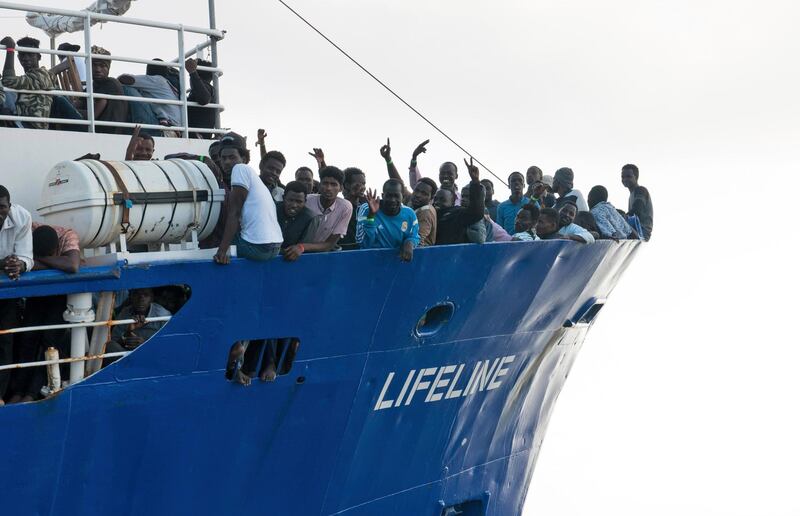Germany and France on Sunday pushed for new solutions to the migration crisis, as bickering among European Union leaders left boats carrying hundreds of African migrants adrift at sea.
Sixteen of the EU’s 28 leaders held emergency talks in Brussels to find a way forward despite a long-standing deadlock over who should take in migrants and refugees who land in Italy and other European countries.
Hundreds of people fleeing conflict and persecution at home are caught in the midst of a worsening row over how to deal with the influx, against a backdrop of mass drownings in the Mediterranean in recent years.
Italy, a country on the front line of the crisis, has turned away rescue vessels, with its new populist government demanding greater solidarity from reluctant fellow EU states.
One boat, the Lifeline, remained in limbo on Sunday with 239 Africans aboard, including pregnant women and children, with Malta and Italy refusing to take it in, after the Aquarius suffered a similar fate until it was allowed to dock in Spain.
Far-right Italian Interior Minister Matteo Salvini bluntly told foreign charities on Sunday to stop rescuing migrants off Libya, where one group said 1,000 people were on boats in distress.
He accused them of abetting people smugglers.
But the German operators of the Lifeline hit out at Mr Salvini for referring to its passengers as a consignment of "human flesh".
“Dear Matteo Salvini, we have no meat on board, but humans,” it said in a statement.
The plight of the stranded migrants lent a sense of urgency to the meeting in Brussels, which was riven with divisions and snubbed by countries taking a hard line on the issue.
French President Emmanuel Macron and German Chancellor Angela Merkel vowed to forge ahead with like-minded leaders on ways to reduce migrant flows and share responsibility for those who land on Europe’s shores.
Mrs Merkel, who is scrambling to prevent a mutiny in her government over migration, admitted there were still “some differences”, but also “a great deal of common ground”.
Mr Macron pointed to the sharp drop in Mediterranean crossings since 2015 as proof that the crisis is now mainly “political”, fuelled by the rise of anti-immigration populists.
Italy has accused him of “arrogance” and placed the responsibility for saving migrants in the Mediterranean squarely at the feet of Libya, much of which is lawless.
Officials warn that a new surge of migrants could trigger the collapse of free travel within the EU, its signature achievement.
“Our top priority, if we want to save free movement within the Schengen area, is to ensure real, strict controls of the EU’s external borders,” Belgian Prime Minister Charles Michel said.
Sunday’s meeting paves the way for a full EU summit on Thursday and Friday.
Hungary, Poland, the Czech Republic and Slovakia, which have refused to take in refugees from overstretched countries such as Italy and Greece, boycotted the Brussels meeting.
Mr Macron has infuriated Italy by accusing it of “irresponsibility” for turning away migrant vessels and denouncing the “leprosy” of rising populism.
Italy has in turn accused France of hypocrisy, noting that Paris keeps pushing migrants back across their shared border.
Under the EU's so-called Dublin rules, asylum seekers must be processed in the country where they first arrive – usually Italy, Greece or Spain.
EU leaders last December had set the end of June as a deadline to establish a permanent mechanism to distribute asylum seekers throughout the bloc, but an agreement has proved elusive.






